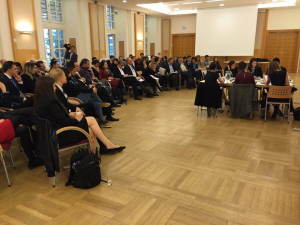Nanyang Business School, Singapore, was recently represented at The Negotiation Challenge (TNC) 2016, held in Vienna, Austria on 1st and 2nd April, 2016.
It was the first time that a team from Nanyang MBA, comprising of Laveesh Hassija, Shajitha Sinasamy and Akshaya Kumar, who decided to name themselves as ‘The Nanyang Negotiators’, participated in this prestigious competition.
The Negotiation Challenge is one of the only few international negotiation competitions in the world. The competition is aimed at gathering world’s best student negotiators, allowing them to compare their negotiation skills and preparing them for the complex negotiations they will face after graduation. This year, 16 universities from across the world participated in TNC.
TNC has been an extraordinary experience for the Nanyang team that worked hard under the guidance and support received from the NBS Negotiation Professors – Valerie and Kit Wye. The team participated in a total of five rounds, wherein they were evaluated on application of appropriate methods from the whole spectrum of their negotiation skills in different negotiation situations. In some of the rounds, the evaluation was based on the team’s ability to understand interests and identify issues, as well as their ability to create and claim value,while in other rounds the assessment was based on the instrumental and/or relational outcome of the negotiations.
Though the Nanyang Negotiators could not reach the final round, they were able to demonstrate their negotiation intelligence and recall TNC as the most eventful time of their MBA journey. The team enthusiastically remembers one of the rounds where they were asked to negotiate with another team in a moving Vienna tram. This round tested their ability of managing a negotiation without being influenced by external factors.
The Nanyang Negotiators in action
The competition venue in Vienna
The Nanyang MBA TNC team for 2016 – The Nanyang Negotiators is extremely proud to have exemplified Nanyang Business School at this highly admired competition that invites world’s top business and law schools. Their experience in the competition has instilled in them stronger confidence for business negotiations that they will be facing in their careers after their MBA. The Nanyang Negotiators not only got a chance to experience diverse ways of negotiation, but also to meet and network with students from various countries with different backgrounds and cultures. The learnings from the competition and the cherished memories they have from the beautiful city of Vienna are definitely going to last a life-time.






You must be logged in to post a comment.